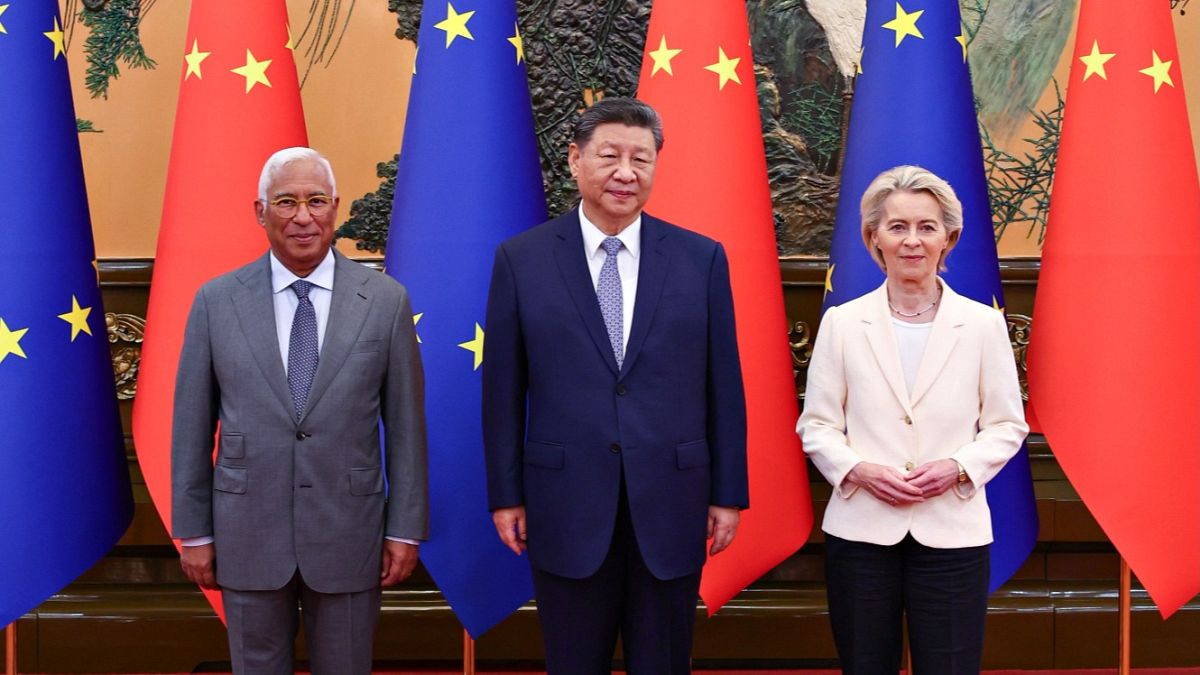The European Union announced on Thursday a tentative agreement with China to alleviate restrictions the country had placed on critical exports of rare earths, which had caused alarm across the bloc and threatened to paralyse entire industries.
The stringent curbs, which began in early April amid a trade spat with the United States, severely affected the global supply of seven rare earth elements and magnets needed for the defence, energy and automotive sectors.
“These export controls have placed significant strain on some European companies,” said Ursula von der Leyen, the president of the European Commission, at the end of a one-day summit in Beijing.
“To keep trust in our trade relationship, we need reliable and secure supplies of critical raw materials from China.”
Von der Leyen welcomed China’s efforts to fast-track export licences for rare earths and the establishment of a new system to address barriers and delays in the supply chain.
“We agreed, and this is new, to have an upgraded export supply mechanism,” she said. “In other words, if there are bottlenecks, this (system) can immediately check and solve the problem or the issue that is out there.”
Still, von der Leyen insisted much more progress was needed to significantly rebalance EU-China trade relations, which last year saw a deficit in goods of over €300 billion. The figure risks expanding in 2025 due to sluggish demand from Chinese consumers and the prohibitively high tariffs imposed by US President Donald Trump.
“We have reached a clear inflection point,” she said.
“As we said to the Chinese leadership, for trade to remain mutually beneficial, it must become more balanced. Europe welcomes competition. But it must be fair.”
Besides the restrictions on rare earths, von der Leyen singled out two areas in which progress was “possible and needed” in the short term.
First was the bloc’s long-standing demand to secure greater and freer access to the Chinese market to match the access that Chinese firms enjoy in Europe.
Second was the issue of industrial overcapacity, which has been linked to Beijing’s lavish use of subsidies to boost domestic producers and artificially lower the price of their manufactured goods to the detriment of international competitors.
The clash came to a boil in October when the EU slapped steep duties on China-made electric vehicles (EVs) to offset the effects of state aid. Decrying the measure as a “naked act of protectionism”, Beijing responded with probes into EU-made brandy, pork and dairy, which Brussels then denounced as unfair and unjustified.
As expected, the one-day summit failed to deliver progress on these open fronts.
In an ominous note, von der Leyen said that unless China makes concessions to mitigate its overcapacity, “it would be difficult for the EU to maintain its current level of openness”.
Speaking by her side, António Costa, the president of the European Council, also expressed serious concerns about the lopsided state of EU-China commerce.
“A fair and mutually beneficial trade relation is possible and should be our joint aim,” Costa said, highlighting the bloc’s readiness to engage in “open and constructive dialogue to find shared solutions”.
“Now it is time to put today’s discussion into action,” he added.
Lingering tensions
The read-outs released by the Chinese government were more buoyant, promising “new opportunities and potentials” in EU-China relations.
The statements included pointed warnings to deter the European Commission from deploying its trade measures against Chinese products, however, as it did in the row over electric vehicles and, more recently, public procurement of medical devices.
“It is hoped that the EU can remain open in trade and investment market, refrain from using restrictive economic and trade tools, and foster a sound business environment for Chinese enterprises investing and operating in the EU,” Chinese President Xi Jinping said during the meeting, according to the read-out.
Xi also criticised the bloc’s mission to reduce vulnerable dependencies on China, which von der Leyen has promoted as “de-risking” and the G7 has adopted as official policy.
“Boosting competitiveness should not rely on building walls or barriers, as decoupling and severing supply chains will only result in self-isolation,” the Chinese leader said.
Another topic on which the two sides failed to make progress was Russia’s war on Ukraine. The EU has repeatedly accused China of acting as a “key enabler” by supplying 80% of the components that the Kremlin needs to build weapons.
Beijing has denied the charges while reaffirming its “no-limits” partnership with Moscow.
“As a permanent member of the UN Security Council, China has a key role and responsibility for this,” Costa said in the closing press conference.
“The war in Ukraine goes far beyond Europe – it is a conflict with global implications, that undermines the rules-based international system. It is not just a ‘European conflict.”
Von der Leyen urged China to leverage its influence to force Russia into accepting a ceasefire in Ukraine, a long-chased goal that Western allies have not succeeded in realising despite successive rounds of sanctions.
“How China continues to interact with Putin’s war will be a determining factor for our relations going forward,” she said.
Thursday’s summit ended with a joint declaration on climate action ahead of the COP30.
Read the full article here


